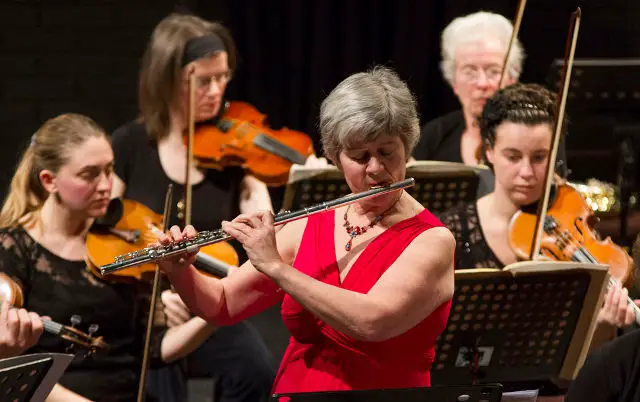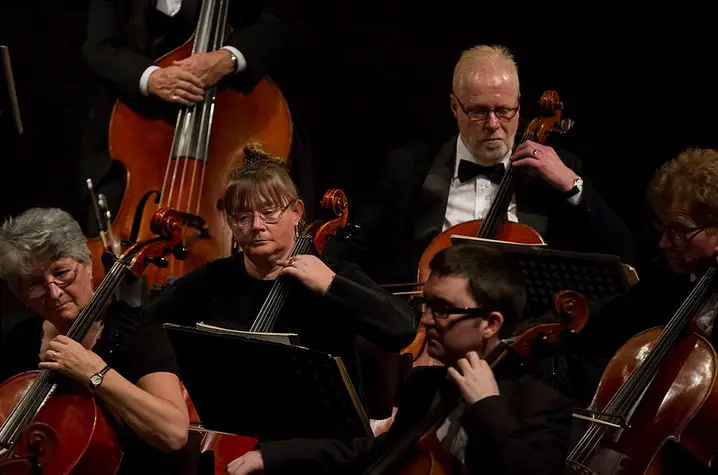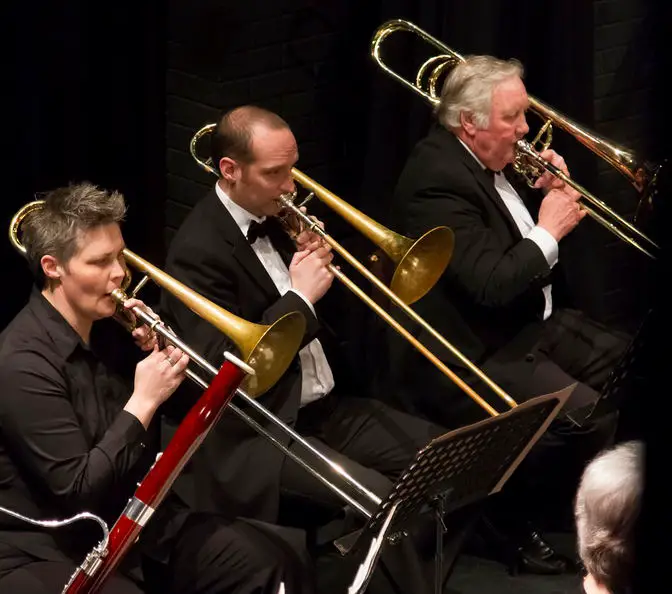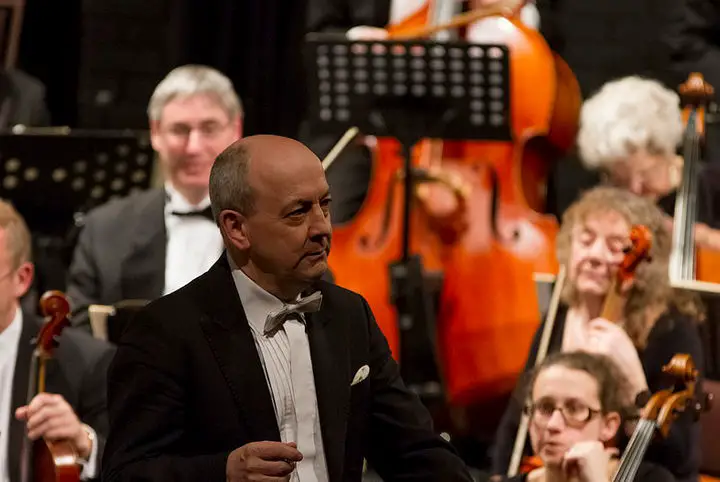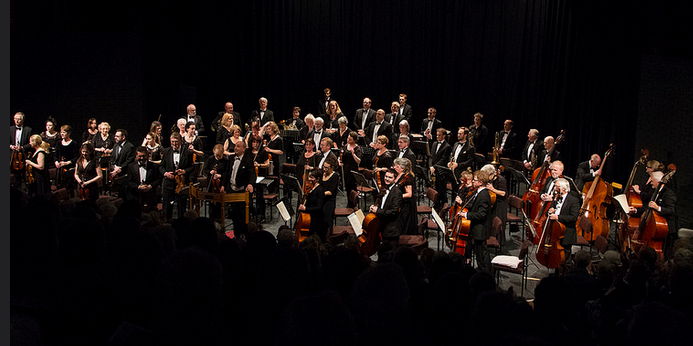Our thanks to Jonathan Dodd for his latest review of the Isle of Wight Symphony Orchestra. Ed
Last Saturday we went to the third concert in the Isle of Wight Symphony Orchestra’s current season. There was an intriguing mix of music on offer as far as I was concerned, with some familiar pieces and others I had never even heard of.
I do admire the IWSO for their desire to tackle music that doesn’t always make the Top 100 Classics that you can buy in CD compilations. They set their musical bar high, and they give people like me, with not much more than a musical smattering, the chance to experience new and completely fresh works that I would probably never hear, let alone watch actually being performed right in front of me.
I shall never lose the joyful sense of anticipation when I sit down at the start of each concert, and every time I’m amazed at the quality of the playing, individually and all together, that I witness. I hope the IWSO continues to surprise and challenge me for many years to come.
Russian Dances from Eugene Onegin
This time there were two pieces I thought I knew, and two more by composers I thought I knew, and one piece of which I had no knowledge at all. The first part of the concert was made up of two dances by Tchaikovsky from the opera Eugene Onegin. They were delightful, full of melody and movement, with a terrific sense of energy that made me want to get up and dance myself. I imagine many people are grateful that I restrained myself.
I don’t know what a Polonaise looks like, but it felt somehow vigorous and energetic as well as somewhat stately and formal, like a folk dance that had made the transition to elegant drawing rooms. It was lovely, with a sense of restrained exuberance. And the Waltz, starting with a drum roll that gradually built up, was elegant and sweeping. All very Russian and Nineteenth-Century.
Norwegian Elegiac Melodies
After that we were treated to two gorgeous Grieg Elegaic Melodies. Everyone knows the Piano Concerto and Peer Gynt, but Grieg had a love of Norwegian folklore and song that he wove into lots of smaller works. Many of them were songs that his wife Nina sang. These two pieces were originally part of a sequence of 12 poems set to music, rewritten for orchestra but still retaining their structure.
The first illustrated the triumph of hope in the face of misfortune, and the second was elegiac, describing the poet’s feeling during what might be his last Spring. They contrasted in tone and atmosphere, and both were able to repeat the verses in quite different ways, and thereby highlight different instruments and settings. They were typically Grieg, and quite lovely. Definitely something to find on CD for listening again.
French Flute Concerto
Before the interval we were treated to a Flute Concerto, written by Jacques Ibert in 1934. He’s not well-known (at least to me), and wrote music for films as well as many other works. A flautist friend asked him to write a concerto so he did. As far as I could hear, he made it very challenging indeed.
The soloist was Siobhan Cosgrove, who has lived and worked in the Island for many years. She also plays in the orchestra, and is known for her talent and skill with the flute. She was excellent. The piece was very difficult, with many short bursts of melody and dissonance coming from all sides, managing simultaneously to retain the flow of melody, all the time, almost like a patchwork of sound, stitched together by the flute soaring and fizzing and gliding through it all, in complete control.
I particularly liked the second slower movement. It was beautiful. Siobhan Cosgrove played magnificently throughout, and it was a pleasure to watch the orchestra welcoming and enjoying working with one of their own, with great affection and enormous pride. I thought it was wonderful to be able to showcase home-grown talent in this way.
Hardy’s Heath by Holst
After the interval there was a piece by Holst, who I know from the Planets and not much else. I thought I would know what to expect, and it was very different. Jonathan Butcher, the IWSO’s resident conductor, told us that Holst believed this piece, called Egdon Heath, was his masterwork, and that it was in tribute to his friend and favourite author, Thomas Hardy, after being impressed with his inspired description of the place in The Return of the Native.
I have now revised my understanding of Holst, because the piece was dark and intensely atmospheric, with a lot of very subtle dissonances, starting with a slow melody from the double basses, played so that the whole building seemed to vibrate, with some notes that thrilled with their not-quite-harmony and set the tone for what was to come. It was full of colour and short bursts of melody, and gave a wonderful impression of the size and scale and wildness of Egdon Heath, and of the tempestuous and varied emotions that it aroused.
Bohemian Symphonic Variations
Lastly, the whole orchestra settled down to play some Dvorak. I am familiar with some of his symphonies, notably one played recently by this very orchestra. This time we were treated to his Symphonic Variations, which is another way of describing a set of different treatments of an original piece of music. It was explained to me, and I’m afraid I thought – ‘This is what they did before they invented Jazz!’
The main pleasure of the piece is not to worry too much about what it might mean, unless you’re very knowledgeable about music, which I’m not, in which case there’s plenty to enjoy in unravelling its musicological niceties. I just sat back and revelled in the enormous variety of moods and sounds and combinations of music that the orchestra obviously loved to be able to produce. It all built very satisfactorily to a grand climax, full of surprises and sudden changes, until the big and dramatic ending.
Great German Music
It was just the right thing to send me out grinning into the night, delighted once again to have had the opportunity to go and watch this orchestra play so exuberantly and well.
I shall be back for the next one, on 16th May, which will be very German, with works by Wagner and Schubert, songs by Mahler, with soloist Megan Quick, and another Second Symphony, this time by Brahms. Fantastic!
Grab a ticket or two while there are still some to buy, and –
See you there!
Image: © With kind permission of Allan Marsh

